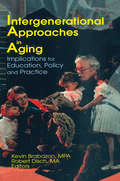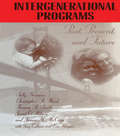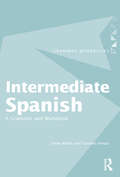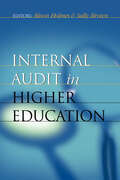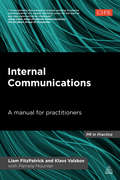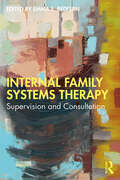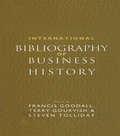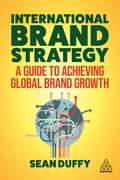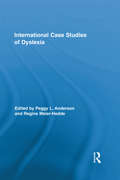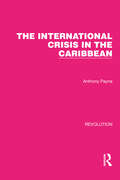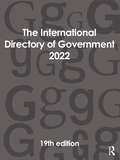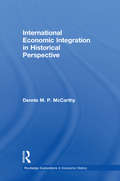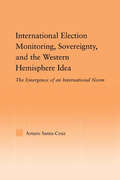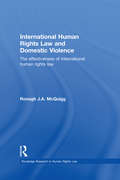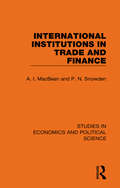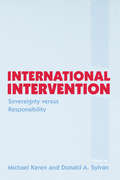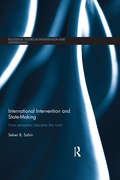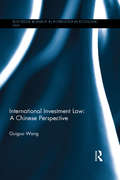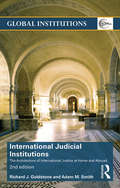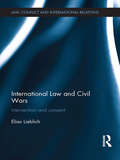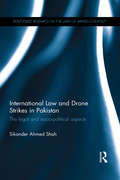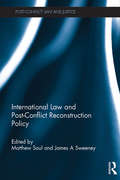Special Collections
Benetech’s Global Certified Accessible Titles
Description: Benetech’s GCA program is the first independent third-party EPUB certification to verify ebook accessibility. By creating content that is born accessible, publishers can meet the needs of all readers. Learn more: https://bornaccessible.benetech.org/
- Table View
- List View
Interesting Women
by Andrea LeeFrom the acclaimed author of Red Island House, this brilliant, outrageous collection of short stories confronts identity, desire, colliding cultures, and self-discovery.In vivid prose infused with wicked irony, award-winning author Andrea Lee takes us on a dazzling international journey into the hearts and minds of a number of extraordinary women—intelligent, cosmopolitan, and fiercely independent—who, with wit and style, grapple with questions of identity in an increasingly connected world where everyone has become, in some way, a foreigner. In &“The Birthday Present,&” a seemingly conventional American wife explores the wilder shores of marital devotion by giving her Italian husband an outrageous gift. &“Winter Barley&” is the account, alternately lyrical and perverse, of the brief love affair in Scotland between an elderly European prince and a thoroughly modern New England beauty half his age. And in the collection&’s title story, &“Interesting Women,&” a woman on vacation in Thailand reflects with wry detachment on the confessional relationships that spring up between women (&“another day, another soul laid bare&”), before falling into one herself, which culminates in a hilarious and absurd odyssey through the jungle. Lee&’s beautifully crafted stories offer a rare combination: a sensual evocation of the moment, and profound insight into the underlying struggles—of gender, race, and class—that continue to shape our world. Critically acclaimed when it was first published, this collection is ready to be embraced by a new generation of readers.
Intergenerational Approaches in Aging
by Robert Disch and Kevin BrabazonIn Intergenerational Approaches in Aging: Implications for Education, Policy, and Practice, leading practitioners and academics from a variety of disciplines come together to discuss theoretical issues, current practice, and future directions for this rapidly developing field. The authors address key topics such as defining the intergenerational field, the effects of the segregation of groups by age on social function and organization in our communities, and designing, implementing, and assessing programs that create cross-generational connections. Exploring ways to provide services to different age groups while tapping the strengths and skills of each age group, Intergenerational Approaches in Aging examines the application of intergenerational approaches to important social issues as well as specific challenges faced by practitioners. It makes suggestions for integrating intergenerational studies into the higher education system and for challenging segregated services and funding programs. As the book shows, promoting cooperation between diverse segments of society also depends on:making intergenerational programming a permanent feature of public schoolsunderstanding and meeting the social, mental health, and medical needs of grandparents who are raising their grandchildrenusing observational research to study and evaluate intergenerational program effectiveness and the relationships among the people involvedviewing differences among people as assetsdeveloping intergenerational program modelsproviding children with a 'life-cycle’view of the worldIntergenerational Approaches in Aging offers the personnel of state and local agencies on aging, nursing homes, senior centers, and geriatric homes practical advice, innovative ideas, and supportive materials for developing and implementing intergenerational activities and programs that can benefit all parties involved. Academics and school administrators will also benefit from this book as they learn concrete methods for integrating aging education into already existing curricula and building new conceptual frames of reference for a wide variety of social issues and historical topics.
Intergenerational Programs
by Sally NewmanFirst published in 1997. Routledge is an imprint of Taylor & Francis, an informa company.
Intermediate Spanish
by Irene Wilkie and Carmen ArnaizThis text is designed for learners who have achieved basic proficiency and wish to progress to more complex language. Each of the units combines concise grammar explanations with examples and exercises to help build confidence and fluency. Features include: clear explanations of the similarities and differences in English and Spanish grammar authentic language examples from a range of contemporary media reading comprehensions at the end of each unit full cross-referencing throughout extra tips on language learning and learning specific grammar points. Suitable for students learning with or without a teacher, Intermediate Spanish, together with Basic Spanish form a structured course in the essentials of Spanish grammar.
Internal Audit in Higher Education
by Sally Brown and Alison HolmesThis volume describes a range of experiences of internal audit in higher education institutions from the UK, USA, Australia, New Zealand, South Africa and Germany. It presents approaches to best practice designed to enable readers to assess and develop their own audit procedures.
Internal Communications
by Liam Fitzpatrick and Klavs ValskovGet internal communications right in your organization and the benefits are clear. Motivated staff, better financial performance, a strong external reputation and delighted customers are just a few of the reasons why getting your message over to staff effectively matters.Internal Communications explores what good practice in internal communications looks like, providing a no-nonsense approach to devising an internal communications strategy based on the authors' extensive experiences as consultants and in-house leaders in the private, public and not-for-profit sectors. It provides a step-by-step guide to: -Building an internal communications team and plan -Devising messages and deciding which channels to use - Working with line managers and senior leaders -Researching and evaluating internal communications -Supporting change within an organizationSupported by easy to follow models, example explanations of the core theory, and case studies, Internal Communications provides students and internal communicators alike with the practical tools and advice they need to make a difference in an organization.
Internal Family Systems Therapy
by Emma E. RedfernInternal Family Systems Therapy: Supervision and Consultation showcases the skills of Richard C. Schwartz and other leading IFS consultants and supervisors. Using unique case material, models, and diagrams, each contributor illustrates IFS techniques that assist clinicians in unblending and accessing Self-energy and Self-leadership. The book features examples of clinical work with issues such as bias, faith, sexuality, and sexual hurts. Individual chapters focus on therapist groups, such as Black Therapists Rock, and on work with specific populations, including children and their caregivers, veterans, eating disordered clients, therapists with serious illnesses, and couples. This thought-provoking book offers an opportunity for readers to reflect on their own supervision and consultation (both the giving and receiving of it). It explores what is possible and preferable at different stages of development when using the IFS model.
International and Comparative Criminal Justice
by Mark J. FindlayInternational criminal justice is in transition. This book explores the growing internationalisation of criminal justice as a phenomenon of global governance. It provides students with a critical understanding of ?the international institutions for regulating transnational crime, the development of alternative justice processes across the globe, and international and supra-national co-operation criminal justice policies and practices. Key topics covered include: The historical development of International Criminal Justice institutions and traditions International Restorative Justice Victim communities and collaborative justice The relationship between crime and war International Human Rights The ‘War on Terror’ The globalisation of crime and control Developments in global governance, communitarian justice and accountability This text will familiarize students with the literature and debates surrounding international criminal justice and enable them to critically appreciate their theoretical and policy context. In doing so, it encourages students to assess the strengths and weaknesses of different approaches to the study of global justice and the analysis of comparative policy convergence and research. It will also help students to reflect on, and communicate in an informed and critical way theoretical accounts and empirical studies within the field of international criminal justice. This book will be essential reading for upper level undergraduates taking courses in criminal law, international relations and governance and postgraduates engaged in international criminal justice, international law, regulation and governance and human rights.
International Bibliography of Business History
by Terry Gourvish and Francis Goodall and Steven TollidayThe field of business history has changed and grown dramatically over the last few years. There is less interest in the traditional `company-centred' approach and more concern about the wider business context. With the growth of multi-national corporations in the 1980s, international and inter-firm comparisons have gained in importance. In addition, there has been a move towards improving links with mainstream economic, financial and social history through techniques and outlook. The International Bibliography of Business History brings all of the strands together and provides the user with a comprehensive guide to the literature in the field.The Bibliography is a unique volume which covers the depth and breadth of research in business history. This exhaustive volume has been compiled by a team of subject specialists from around the world under the editorship of three prestigious business historians.
International Brand Strategy
by Sean DuffyIn theory, the Internet allows all brands to market internationally. But in practice, most companies struggle to compete outside their home market. Written from a marketing practitioner's perspective, International Brand Strategy evens the playing field with clear, actionable techniques to guide any organization going through the process. This book helps companies build sales in foreign markets, but just as important it helps them thrive by maintaining price integrity and building brand equity at the same time. With the guidance provided in International Brand Strategy companies hit the ground running in foreign markets. This provides a competitive advantage from day one, empowers companies to avoid costly mistakes, and saves months of trial and error. The book lays out a unique methodology for managing brands abroad that can be implemented for any product in any market. These methods have proven their value for companies large and small across six continents. The book guides readers with pragmatic models and a wealth of examples from the Americas, Europe, and Asia. International Brand Strategy was written for those who are planning to enter a new market and for those who are already there but wish to improve their brand's performance. It helps the reader recognize some of the most common pitfalls and how to avoid them, provides practical tips to understand the dynamics of price, product and value from a foreign buyer's perspective, and defines a conceptual framework to assess and improve brand equity at home and abroad.
International Business
by Alan SitkinThis eagerly awaited update of a popular text has been substantially revised and updated to incorporate developments in the field of International Business. It continues to do so in Alan Sitkin's characteristically direct, lively and accessible style which is ideal for introductory students. This new edition expands upon issues of growing importance to global businesses, including corporate social responsibility, corporate citizenship and sustainability. It explores topics of great importance to business at the start of the new decade, including digital transformation and digital business, and explores the intersection of technology and pandemic-accelerated change to look to the future of business in a global setting. Enriched with practitioner examples as well as new, colourful and illustrative cases, and ideally structured to make navigation and learning straightforward, this textbook is an ideal introduction to international business. Tutors are supported with a range of materials including an instructor manual, testbank, suggested assignment questions and resources to offer their students, such as revision tips, additional cases and self-test multiple-choice questions.
International Case Studies of Dyslexia
by Peggy L. Anderson and Regine Meier-HeddeDyslexia is a disability that exists in all countries that have high expectations for literacy. The inability to read in spite of normal intellectual potential represents one of the most puzzling educational challenges for literate societies, regardless of the culture or language. This book examines medical, psychological, educational, and sociological data from comprehensive case studies of preteen dyslexic children, in order to profile the disability as it occurs in seventeen different nations. Interviews with the children and their parents reveal how children with dyslexia are identified and treated around the world, and provide a look at various perceptions of dyslexia and its challenges. Researchers and practitioners in education, psychology, and health-related professions will find this case book to be an excellent reference. Parents of children with dyslexia will find the advocacy recommendations helpful.
The International Crisis in the Caribbean
by Anthony PayneThis book, first published in 1984, presents a comprehensive survey of the forces of change that operate in the Caribbean, an area of political instability at the time. It examines the internal politics of the different countries and considers the roles of the United States, Cuba, the European and new Latin American powers in the political conflicts, coups and revolutions.
The International Directory of Government 2022
by Europa Europa PublicationsThe International Directory of Government is the definitive guide to people in power in every part of the world. All the top decision-makers are included in this one-volume publication, which brings together government institutions, agencies and personnel from the largest nations (China, India, Russia, etc.) to the smallest overseas dependencies (Guadeloupe, Guernsey and Christmas Island, etc). Institutional entries contain the names and titles of principal officials, postal, e-mail and internet addresses, telephone and fax numbers where applicable, and other relevant details. Key features: - comprehensive lists of government ministers and ministries - coverage of state-related agencies and other institutions arranged by subject heading - details of important state, provincial and regional administrations, including information on US states, Russian republics, and the states and territories of India. Contents include: A comprehensive directory section organized by country or territory; Details of co-ordinating bodies, and of foundations, trusts and non-profit organizations; A full index of organizations, and indexes by main activity and by geographical area of activity.
International Economic Integration in Historical Perspective
by Dennis Patrick McCarthyInternational economic integration is not a recent phenomenon; its roots can be traced back to the Roman Empire. This informative volume departs from the conventional short-term analysis and takes a long-term view of the process, offering perspectives that are both detailed and diverse. Author Dennis McCarthy examines seven types of organizations that exemplify international economic integration (colonial empires, merchant associations, religious empires, criminal empires, free trade areas, customs unions and common markets), and representative examples of each type are analyzed in a comparative framework. Timely and unique, this book demonstrates that international economic integration is an economic and political process that also involves political economy. With an introduction defining key terms and concepts; a retrospective summarizing the main insights, and endnotes and a detailed bibliography offering readers ways to pursue these topics further, McCarthy’s book will prove indispensable to students and general readers who wish to gain a firm understanding of international economics and the processes that shape the world today.
International Election Monitoring, Sovereignty, and the Western Hemisphere
by Arturo Santa-CruzThis book traces the process by which national elections became international events or, more precisely, what the effects of this process are on state sovereignty. Contrary to the conventional wisdom in International Relations - to judge by the neglect of this phenomenon in the literature - this book argues that the study of IEM does not belong only in the field of comparative politics. As a system-wide phenomenon, IEM should not be restricted to the study of purely domestic politics or of foreign policy. This book contends that sovereignty has been partially transformed by the recent emergence of IEM. Furthermore, the author locates the origins of this change in the Americas, claiming that the western hemisphere's normative structure - what Santa-Cruz calls the Western Hemisphere Idea (WHI) - was particularly conducive to this new understanding of state sovereignty. This is the first work to engage the issue of IEM in a comprehensive manner from a theoretical perspective. International Election Monitoring, Sovereignty, and the Western Hemisphere covers a broad and relevant scholarly literature, and the cases comparisons widen the book's appeal, since they illustrate a useful range of experience.
International Human Rights Law and Domestic Violence
by Ronagh J.A. McQuiggThis innovative book examines the effectiveness of international human rights law, through the case study of domestic violence. Domestic violence is an issue that affects vast numbers of women throughout all nations of the world, but as it takes place between private individuals it does not come within the ambit of the traditional interpretation of human rights law. Ronagh J.A. McQuigg questions whether international human rights law can only be effective in a ‘traditional’ case of human rights abuse or whether it can rise to the challenge of being used in relation to issues such as domestic violence. The book focuses primarily on the question of how international human rights law could be used in relation to domestic violence in the United Kingdom. McQuigg considers recent case law from the European Court of Human Rights on domestic violence and whether the UK courts could use the Human Rights Act 1998 to assist victims of domestic violence. The book goes on to look in detail at the statements of the international human rights bodies on domestic violence, with particular focus on those made by the United Nations Committee on the Elimination of Discrimination against Women and the Special Rapporteur on Violence against Women. The book explores the impact that the statements have had so far on the UK government’s policy in relation to domestic violence and discusses how the statements made by the international human rights bodies could be used more effectively by non-governmental organisations, such as human rights groups and women’s groups.
International Institutions in Trade and Finance
by A. I. MacBean and P. N. SnowdenOriginally published in 1981, this book provided an up-to-date and critical review of the recent history and current status of the main economic institutions affecting international trade and relations at the time. The authors emphasise the economic effectiveness or otherwise of such bodies as GATT, IMF, EEC, UNCTAD and the World Bank, but take account of the political factors present in both the initial ‘design’ and in the way that the institutions have developed. In particular, the book analyses the changed degree of dominance which the USA had been able to exert on the international community.
International Intervention
by Michael Keren and Donald A. SylvanNational sovereignty, defined as a nation's right to exercise its own law and practise over its territory, is a cherished norm in the modern era, and yet it raises great legal, political and ethical dilemmas. This study looks at the problems created by international intervention.
International Intervention and State-making
by Selver B. SahinThis book analyses the changing dynamics of sovereignty resulting from contemporary international state-building interventions. It aims to highlight how the exercise of ‘exceptional’ forms of power by intervening agencies impacts on the sovereign capacity of intervened states. Drawing upon in-depth analyses of three case studies – Kosovo, East Timor and the Kurdistan Regional Government, the book shifts the focus of the debate to the nature of contemporary intervention as an act of statemaking, and argues that foreign intervention changes the dynamics of political power upon which sovereignty is structured. At the same time, it reveals how intervention reproduces the imposed conditions of international state-making, thus permanently internalising external regulatory mechanisms. International intervention, in other words, becomes the constitutive element of governance in the newly created state. This book will be of much interest to students of statebuilding, war and conflict studies, global governance, security studies and IR.
International Investment Law
by Guiguo WangIncreasing and intensified cross-border economic exchange such as trade and investment is an important feature of globalization. In the past, a distinction could be made between capital importing and exporting countries, or host and home countries for foreign direct investment (FDI). Due to globalization, FDI is presently made by and in both developed and developing countries. Differences in political, economic and legal systems and culture are no longer obstacles for FDI, and to varying degrees the economic development of almost all countries is closely linked with the inflow of FDI. This book conducts critical assessments of aspects of current international law on FDI, focusing on cases decided by the tribunals of the International Centre for Settlement of Investment Disputes (ICSID) and other tribunals as well as decisions of annulment ad hoc committees of the ICSID. In examining such cases, Guiguo Wang takes into account the Chinese culture and China’s practice in the related areas. The book explores topics including: the development and trend of international investment law; unilateral, bilateral and multilateral mechanisms for encouraging and protecting FDIs; determination of qualified investors and investments and consent as conditions for protection; relative and absolute standards of treatment; determination of expropriation in practice; assessment of compensation for expropriation; difficulties in enforcing investment arbitral awards; and alternatives for improving the existing system. The book will be of great use and interest to scholars, practitioners and students of international investment law and international economic law, Asian law, and Chinese studies.
International Judicial Institutions
by Richard J. Goldstone and Adam M. SmithThis fully-updated and much expanded second edition provides a much needed, short and accessible introduction to the current debates in international humanitarian law. Written by a former UN Chief Prosecutor and a leading international law expert, this book analyses the legal and political underpinnings of international judicial institutions, it provides the reader with an understanding of both the historical development of institutions directed towards international justice, as well as an overview of the differences and similarities between such organizations. New to this edition: New updates on recently found records of the United Nations War Crimes Commission. Updates on the recent judicial decisions of the International Criminal Tribunal for the former Yugoslavia and International Criminal Tribunal for Rwanda Updates on the Special Tribunal For Lebanon A re-evaluation of the future of the International Criminal Court International Judicial Institutions: Second Edition will be of great interest to students of International Politics, Criminology and Law.
International Law and Civil Wars
by Eliav LieblichThis book examines the international law of forcible intervention in civil wars, in particular the role of party-consent in affecting the legality of such intervention. In modern international law, it is a near consensus that no state can use force against another – the main exceptions being self-defence and actions mandated by a UN Security Council resolution. However, one more potential exception exists: forcible intervention undertaken upon the invitation or consent of a government, seeking assistance in confronting armed opposition groups within its territory. Although the latter exception is of increasing importance, the numerous questions it raises have received scant attention in the current body of literature. This volume fills this gap by analyzing the consent-exception in a wide context, and attempting to delineate its limits, including cases in which government consent power is not only negated, but might be transferred to opposition groups. The book also discusses the concept of consensual intervention in contemporary international law, in juxtaposition to traditional legal doctrines. It traces the development of law in this context by drawing from historical examples such as the Spanish Civil War, as well as recent cases such those of the Democratic Republic of the Congo, Somalia, Libya, and Syria. This book will be of much interest to students of international law, civil wars, the Responsibility to Protect, war and conflict studies, and IR in general.
International Law and Drone Strikes in Pakistan
by Sikander Ahmed ShahWhile conventional warfare has an established body of legal precedence, the legality of drone strikes by the United States in Pakistan and elsewhere remains ambiguous. This book explores the legal and political issues surrounding the use of drones in Pakistan. Drawing from international treaty law, customary international law, and statistical data on the impact of the strikes, Sikander Ahmed Shah asks whether drone strikes by the United States in Pakistan are in compliance with international humanitarian law. The book questions how international law views the giving of consent between States for military action, and explores what this means for the interaction between sovereignty and consent. The book goes on to look at the socio-political realities of drone strikes in Pakistan, scrutinizing the impact of drone strikes on both Pakistani politics and US-Pakistan relationships. Topics include the Pakistan army-government relationship, the evolution of international institutions as a result of drone strikes, and the geopolitical dynamics affecting the region. As a detailed and critical examination of the legal and political challenges presented by drone strikes, this book will be essential to scholars and students of the law of armed conflict, security studies, political science and international relations.
International Law and Post-Conflict Reconstruction Policy
by Matthew Saul and James A. SweeneyThe trend for international engagement in post-conflict reconstruction has produced a host of best-practice postulates on topics such as local involvement in decision-making, accountability for past atrocities, sensitivity to context, and the construction of democratic institutions of governance. International law has potential relevance for many of these themes, yet the question of how the implementation of best-practice policy recommendations might be affected by international law remains under-examined. This book offers a fuller understanding of the role of international law in the practice of post-conflict reconstruction. It explores how international legal issues that arise in the post-conflict period relate to a number of strands of the policy debate, including government creation, constitution-making, gender policy, provision of security, justice for past atrocities, rule of law development, economic recovery, returning displaced persons, and responsibilities of international actors. The chapters of the book work to reveal the extent to which international law figures in the policy of internationally enabled post-conflict reconstruction across a range of sectors. They also highlight the scope for international law to be harnessed in a more effective manner from the perspective of the transition to peace and stability. The book lays out a basis for future policy making on post-conflict reconstruction; one that is informed about the international legal parameters, and more aware of how international law can be utilized to promote key objectives.

